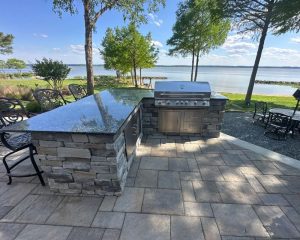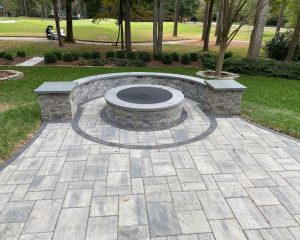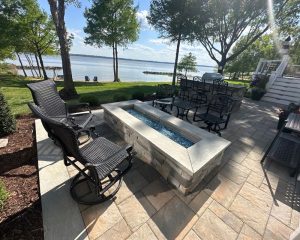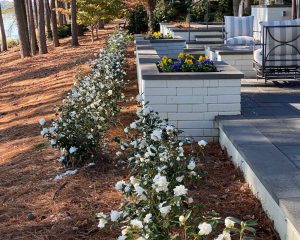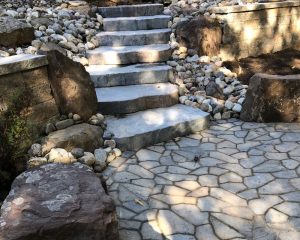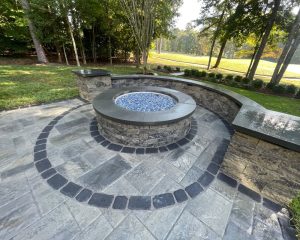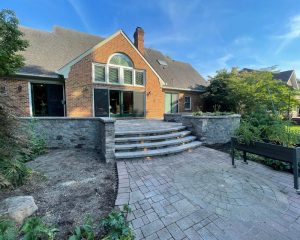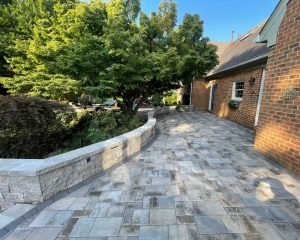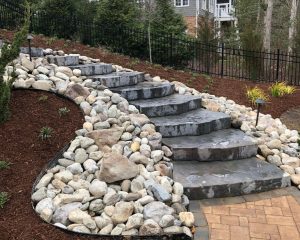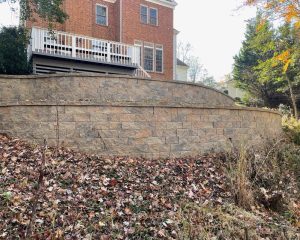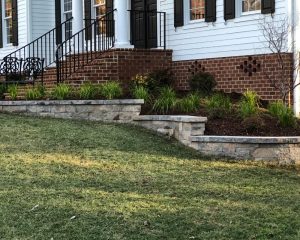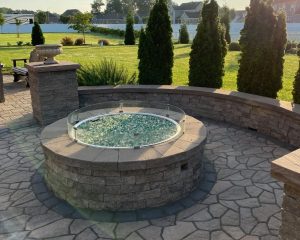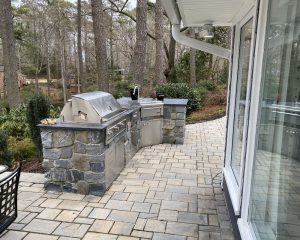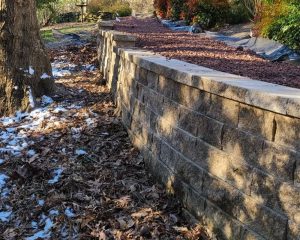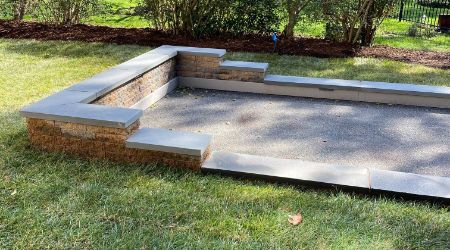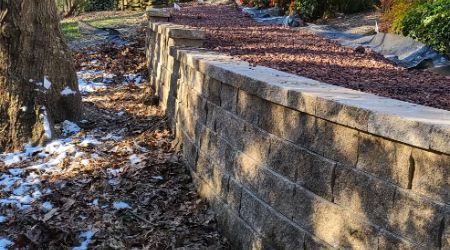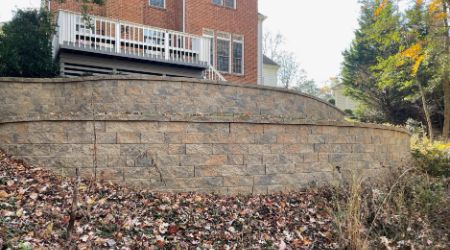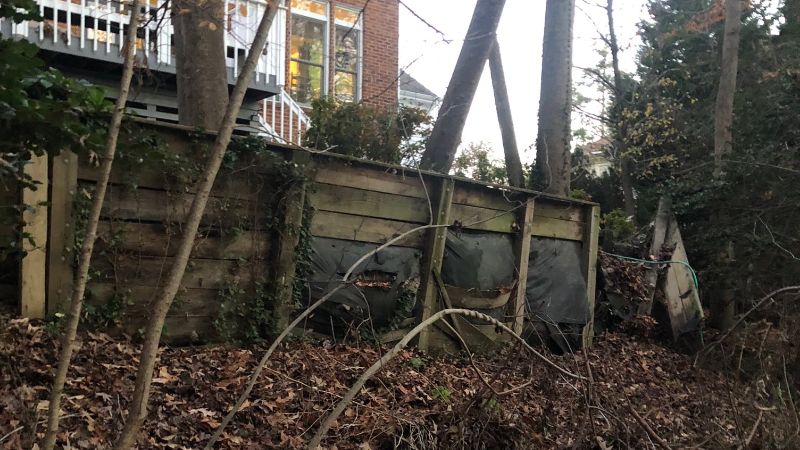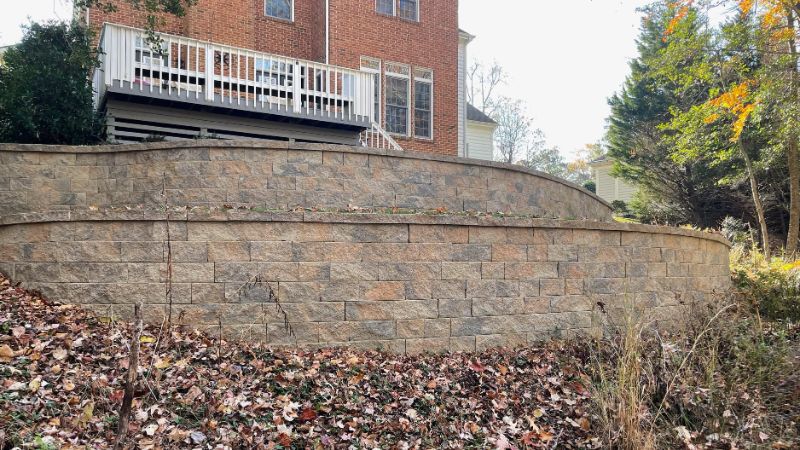Construction Of New Retaining Walls
At Outdoor Living Experts, we're proud to be certified by both the Interlocking Concrete Pavement Institute (ICPI) and the National Concrete Masonry Association (NCMA), ensuring we bring top-level skill to every retaining wall project. We choose to work exclusively with Techo-Bloc’s outstanding retaining wall products, celebrated for their strong build, beautiful design, and innovative features. In the Virginia Peninsula, homeowners often opt for styles like the modern 'Graphix' wall, the adaptable 'Mini-Creta Architectural' series, and the classic 'Prescott' wall. Each offers a unique way to enhance outdoor areas, making them more functional and visually appealing.
Segmented retaining walls bring a lot of benefits to the table. They’re not just good to look at; they’re also flexible in design, affordable, easy to put together, and built to last. These walls are pre-engineered, which means we can construct them according to your project’s specific needs without the immediate need for an architect or engineer’s design. However, for bigger or more complex walls that need it, we have the capabilities to work closely with qualified engineers. This ensures your retaining wall is not just safe and sturdy, but also a beautiful addition to your property.
Retaining Walls & Building Permits in Virginia
When you're looking to build a retaining wall in Virginia, it's important to follow local regulations to ensure safety and compliance. A building permit is required if your wall is over three feet high, situated in a flood risk area, or supporting an unusual amount of fill.
All plans for the retaining wall must adhere to the County Codes (they might vary from county to county) and be submitted with detailed construction documents, including site development and construction drawings, a geotechnical report, and a Statement of Special Inspections, all prepared by licensed Virginia professionals.
Our team, certified by ICPI and NCMA, specializes in Techo-Bloc products, ensuring that your retaining wall is not only compliant and will meet local building codes but will also be durable and aesthetically pleasing.
Proper Drainage For Retaining Walls
We are often contacted by potential customers who have an existing retaining wall that has failed, it’s either falling down, bulging, or collapsing. One of the most common reasons for retaining wall failure is that the original wall was built with poor drainage in place.
Retaining walls are designed to hold back earth from erosion. This also makes them excellent at holding back water too. The water that builds up behind a retaining wall is referred to in the industry as “hydrostatic pressure” and the external force of the soil or fill held behind your retaining wall coupled with the weight of the water held behind it is often enough to seriously compromise the integrity of your wall which can lead to failures such as bulging and even a total collapse.
Well-built retaining walls must incorporate good drainage if it’s going to last for many years. Depending on the type of material being used to build your retaining wall there are a variety of ways to integrate sufficient drainage such as lateral drains, French drains, weeping drains, blanket drains and also the use of very granular soil or fill behind the wall can also work to disperse rather than hold the water.
Understanding Retaining Wall Surcharges
When designing a retaining wall, especially when using premium Techo-Bloc products, it’s vital to take into account any additional loads that may be placed on or near the wall, commonly referred to as "surcharge". This term refers to any extra weight that the wall will need to support, aside from the soil it’s retaining. This could include vehicles like boats or RVs in a designated parking area, or even additional structural elements like tiered walls, fences, or other heavy objects positioned atop or behind the retaining wall.
Ensuring that your Techo-Bloc retaining wall is up to the task requires thoughtful design and expert installation. Our team, with its extensive experience and industry certifications from ICPI and NCMA, is well-versed in accounting for these additional loads in the construction process. We integrate specialized materials such as geo-grid into the structure of the wall, providing enhanced tensile strength to each layer, effectively tying the wall to the soil it’s supporting. This technique is critical for ensuring the long-term stability and durability of the wall, preventing potential issues like buckling or collapse due to the surcharge.
Choosing Techo-Bloc products for your retaining wall not only guarantees a stylish and sophisticated finish but also assures you of the structural integrity required to handle surcharges. Get in touch with us to discuss your specific needs, and let’s create a retaining wall that stands strong, looks great, and lasts for years to come.
Failure to properly stabilize retaining walls is another very common failure that we are called out to repair.
What Materials Do We Use For Retaining Walls?
There are many different materials to build your retaining wall out of. Below are some of the more popular materials in our area because of their availability.
- Block retaining walls
- Natural stone retaining walls
- Large boulder retaining walls
How Our Retaining Wall Construction Process Works
When building a retaining wall on your property that is designed to hold back soil and earth from erosion there is very little margin for error so when required we work directly with engineers if your wall height or surcharge requires it. We use Techo-Bloc pre-engineered retaining wall systems which can eliminate the need for detailed building plans as the system is already engineered.
- We start with our initial consultation.
- We determine how many feet of retaining wall you need.
- We determine the height of the wall and if a building permit or engineer will be required.
- We take into account any surcharges (weight) the wall might be exposed to.
- We consult with you on the materials you’d like your retaining built with.
- We’ll provide you with an accurate written estimate for the work.
The amount of work required to build a retaining wall can vary widely from project to project. The slope of your property, the amount of earth your retaining wall must hold back and the overall accessibility of your property will all contribute to the final cost. We’ll be able to offer you an accurate estimate only after a site visit.

